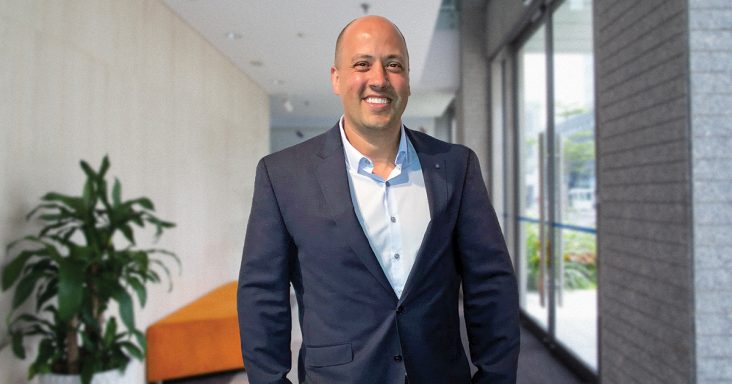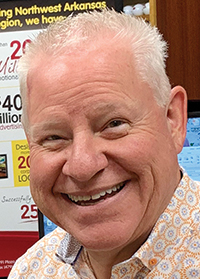What the COVID-19 pandemic means for marketing firms
by July 18, 2020 10:17 am 2,009 views

Derek Champagne, founder and CEO of Fayetteville-based The Artist Evolution, said the agency has maintained existing staffing and given raises amid the COVID-19 pandemic.
Marketing agencies have quickly adapted to changing client needs and consumer behaviors while mostly allowing their employees to work from home and avoiding layoffs amidst the COVID-19 pandemic.
COVID has negatively affected the marketing industry as business closures, event cancellations and paused marketing campaigns have led to reduced sales, said Randy Mullikin, president of The Mullikin Agency in Springdale. But he said the industry has partially offset the losses with increased online and digital ads.
“During these days, many people are home,” Mullikin said. “A lot of people have been in front of their TV screens, in front of their phones, their iPads, their home computers, and so we’ve seen an uptick in business in that area.”
The Mullikin Agency has created videos for clients that include virtual demonstrations and virtual tours of their showrooms. It also sells promotional products, including hand sanitizer, and recently started to deliver it along with disinfecting wipes and masks.
“We never sold a mask in our life,” he said. “But we’re selling customized masks for businesses, for entities now. We have just found different ways to be effective.”
Historically, when the economy declines, advertising is one of the first budgets to be cut, he said. Even so, a grocery store chain that was doing good amid the pandemic had to cancel its advertising because it didn’t have time for new store opening campaigns. Yet, the pandemic has led a transit provider to increase its marketing spending.
The Mullikin Agency received a Paycheck Protection Program loan to remain in business and retain its five employees after sales fell 25%. Business is starting to return, however.
“More than anything, we’re focusing on value over volume this year,” he said. “Maybe we do some things that we weren’t doing before. Now it makes sense for us to do that.”

Amid the pandemic, it has adapted to how it communicates with clients.
“We are doing less in-person meetings, of course,” he said. “We are using our phones, texting, emailing and using Zoom more than ever before to communicate with our clients. I see this continuing for sure.”
‘SEVERE’ SECTOR IMPACT
Some sectors the marketing industry serves have not fared as well as others. The retail, restaurant, auto manufacturing, travel and healthcare industries have cut their marketing budgets as revenue fell, said Mike Sells, CEO of The Sells Agency. But others have experienced growth, including consumer packaged goods, home furnishings, do-it-yourself and mobile internet. Yet, the increase has only partially offset the decline.
“Overall, advertising marketing spending across all sectors is going to be down significantly this year,” Sells said. “Industry folks are saying it could be more severe than the 2008 recession. There’s been a lot of layoffs at the national level in advertising marketing agencies.”
Marketing for network streaming has done OK, he said, which includes Hulu or other networks to which one might subscribe using a smart or mobile device. Digital radio, such as Spotify and Pandora, is doing well.
Something that’s not changed amid the pandemic is strong demand for local news, he said. Ad demand has shifted to sports and local news programs that people are less apt to record but watch live.
“Last time I checked, there’s not just a whole bunch of people lining up to buy spots in the cornhole competition that ESPN has been airing on Saturday afternoons,” he joked. The lack of sporting events has not changed that local news remains a good advertising option, he added.
During the pandemic, The Sells Agency has maintained its staff of 21, and the majority of client spending has remained in place.

“We’ve had to be very nimble and act and work very quickly because many clients needed to adapt their messaging to be appropriate to this new reality,” Sells said. “We’ve had to work quicker than we normally do.”
10% REVENUE DECLINE
This year, marketing industry revenue is expected to fall about 10%, or by $26 billion, in the United States, said Darin Gray, chairman and CEO of Little Rock-based CJRW. Globally, the $650 billion industry was projected to grow $20 million over the next five years, but that was before COVID.
“Consumer behavior has had the greatest impact on marketing since the pandemic hit,” Gray said. “Though restrictions have been eased somewhat, consumers remain cautious about re-engaging personally with the economy.”
The change has led advertisers to shift their spending to align with changing consumer behaviors, such as increased online shopping, and CJRW has been “in lockstep with our clients to help them quickly adapt,” Gray said. “The traditional call-to-action message in marketing has been to ‘get up and go.’ During the pandemic, the call-to-action changed to ‘stay home and do business remotely.’ That’s a big shift in messaging.”
Tourism, especially in Arkansas, has been one of the hardest hit industries in the pandemic. CJRW recently laid off eight of its 61 employees as its client base is mostly in the tourism, hospitality and travel industry.
“This industry has gotten hammered by the pandemic,” Gray said. “We are hopeful it will bounce back soon but to what extent is still unknown.” He noted the importance of Arkansans choosing stay-at-home vacations to support the state’s second-largest industry behind agriculture.
“COVID-19 has jeopardized the livelihoods of approximately 67,000 Arkansans who work in the industry,” he said. “I want to personally encourage Arkansans to invest locally. Forgo that trip to the beach in Florida and invest in Arkansas.”
BUSINESS NOT USUAL
With the advent of the pandemic, growing political unrest and protests, empathy has become the new currency and serving eclipsed selling, said Derek Champagne, founder and CEO of Fayetteville-based The Artist Evolution. Brands are focused on understanding, compassion and humanity.
In the first few weeks of the pandemic, most of the agency’s brands paused ad spending because of the uncertainty, he said. It lost about 70% of business in 10 days but has since recovered, and is about a month from offsetting the loss.
“Our first quarter, best quarter ever in 2020,” he said. “Second quarter, worst quarter ever. Third and fourth, plan to make that up and have our best year ever. The reason we’re able to do that is we’re not just selling products. We’re selling territories and building partnerships.”
In the work that’s been done, it’s being completed quickly, with campaigns being developed and becoming active within 72 hours.
“Our traditional book of business flipped about 60% in a month,” Champagne said. “Mainly technology and healthcare technology and app-focused businesses and even other agencies looking for positioning. It was a significant change for us.”
Most of the new business includes technology companies looking to reach the market appropriately. That includes launching tourism apps and building safety programs.
Something that hasn’t changed is good products with authentic messaging will continue to excel, Champagne noted. The agency has 34 employees and didn’t have layoffs amid the pandemic. Instead, it gave raises, he said. Also, it recently opened an Atlanta office and has a New York office. It’s expected to open locations in Austin, Dallas and Nashville, Tenn., over the next three months.
